Croatia Logs 431 New COVID Cases, 3 Deaths, Over 5 million Doses Administered So Far
ZAGREB, 18 June Zagreb - In the last 24 hours, there have been 431 new cases of the infection with coronavirus, and three more COVID patients have died raising the death toll to 16,027 in Croatia, the national COVID-19 crisis management team reported on Saturday.
There are currently 2,190 active cases, including 158 hospitalised patients, of whom eight are on ventilators.
Since the first registered case of the infection with this novel virus in Croatia on 25 February 2020, over 1.14 million infections have been diagnosed.
Until this Friday (17 June), 5,256,551 shots of vaccines have been administered in Croatia, and 70.81% of adults have been inoculated.
12.2 million doses procured, nearly 5.3 million administered to date
To date, Croatia has procured 12.2 million doses of vaccines against this infectious disease, according to the data released by the Croatian Institute of Public Health (HZJZ).
Currently 1.3 million doses are being stored in the country. Croatia had to destroy 355,000 doses of vaccines after their expiry date.
Croatia has also donated two million doses.
Croatian and Austrian Green Parties to Step Up Cooperation
ZAGREB, 18 June 2022 - The president of the Styrian Green Academy Sigrid Binder and the head of Croatia's Green Alternative, Zorislav Antun Petrović, on Saturday held a meeting at which they concluded that the bilateral cooperation between Green parties in Croatia and Austria was very good and vowed to further it.
Binder was quoted in a press release issued by the Green Alternative Orah as saying that she arrived in Zagreb to see how the local red-green coalition is functioning in the city.
She recalled that also in the Styrian capital of Graz, a coalition of the Greens, the Communist Party of Austria and Social Democrats of Austria is in power.
During their visit to Zagreb from last Wednesday to Saturday, members of the Green Academy were informed about the local municipal issues such as public transportation.
Binder noted that there are too many cars in Zagreb that do not only make transport more difficult but also worsen the air quality.
We hope that some of the solutions applied in Graz and Austria could be applicable here too, she said.
Plenković: Constructing Pelješac Bridge One of Best Moves Proving Modern Sovereignty
ZAGREB, 18 June 2022 - Prime Minister and Croatian Democratic Union (HDZ) leader Andrej Plenković said on Friday that the HDZ was committed to modern sovereignism and that the present-day sovereignism meant the construction of Pelješac Bridge to connect southernmost Croatia with the mainland.
Addressing a ceremony held to mark the 33rd anniversary of the establishment of the HDZ party in Zagreb, Plenković said that the priorities of the present-day sovereignty differed from the sovereignty's priorities some 30 years ago, and in this context he underscored the forthcoming inauguration of Pelješac Bridge on 26 July that will connect southernmost Croatia with the rest of the country.
The present-day priorities mean making efforts to join the euro area, he said recalling that the European Union's finance ministers endorsed Croatia's admission to the euro zone on 1 January 2023.
Also the modern sovereignty is proved by Croatia's admission to the Schengen area next year, and the investment in the procurement of multipurpose fighter jets and the highest investments in the Croatian defence system against a backdrop of the security threats, he said.
Commenting on the role of the state in times of crises, Plenković recalled the challenges his cabinet has so far dealt with: the case of the Agrokor company, the service of huge debts of Croatian shipyards, the coronavirus pandemic, two devastating quakes in northern and central Croatia in 2020 and the crisis caused by Russia's aggression against Ukraine.
We are here, jobs have been retained, we have a positive economic growth and we have an investment grade. We no longer have excessive budget deficit, we have exited from excessive macroeconomic imbalances. The authorities stand behind 700,000 workers in the private sector and their salaries, and has helped over 120,000 companies to survive the crisis, Plenković said.
Plenković said that the HDZ party is homogeneous today and keeps high approval ratings in comparison to similar parties in central and eastern Europe that were founded at a watershed era when the Berlin Wal fell, the Communist systems were removed and when a wave of democracy spread over eastern Europe.
Albanian Minister Says Her Country Taking Steps to Stop Flow of Garbage to Croatia
ZAGREB, 18 June 2022 - In winter, particularly when strong southern winds blow, sea currents bring garbage from Albania along the coast of Montenegro to Croatia's southern Adriatic areas, which is an important environmental issue raised also in bilateral and multilateral meetings.
Therefore during a recent Adriatic-Ionian Forum in Tirana, reporters asked Albanian Tourism and Environment Minister Mirela Kumbaro about his topic, and on that occasion she said that sea pollution was a very important topic and she promised to provide answers in greater detail by e-mail.
A month after the forum, Minister Kumbaro said in her response that she had already taken some concrete steps in prevention of sea pollution which is also damaging to Albania and its burgeoning tourism industry.
She said that she had initiated a national clean-up plan and campaigns as well as the campaigns for raising awareness about this issue.
She also mentioned plans for investing into landfills and their rehabilitation.
Four years ago, Albania, with the support of the Swiss government, started identifying all the landfills near its coast and rated them in compliance with its national legislation.
The next step was to start relocating waste and to manage waste appropriately.
The Albanian government provides financial support to local authorities in these efforts, says Minister Kumbaro.
The supervision of waste management has been also stepped up.
On 1 June, a ban on the use of plastic bags entered into force in Albania.
Croatian MEP writes to EC about plastic waste in the Adriatic Sea coming from Albania
In early February, a Croatian member of the European Parliament, Karlo Ressler, sent a letter to the European Commission about plastic waste in the Adriatic Sea coming from Albania.
More that 90% of plastic waste and other types of waste come to Croatia's coast from the south, notably from Albania, this HDZ/EPP representative says.
Over 229,000 tonnes of plastics end up in the Mediterranean annually, and the sea currents and relatively shallow sea make Croatia exposed to plastic waste from the Mediterranean. More than a decade ago, Albania's government announced an investigation into plastic pollution coming from Albania to Croatia, however, there have been no results, said the MEP.
In his capacity as a member of the delegation to the EU-Albania Stabilisation and Association Parliamentary Committee, Ressler asked the EC to find ways to intervene through European programmes of environmental protection and Albania's accession negotiations to address this matter.
FACC Aerospace Company Opens High-Tech Plant in Croatia, Expansion Already in Plans
June 18, 2022 - With international customers, shareholder representatives, long-time companions, representatives of the Austrian and Croatian governments, and the entire workforce, the new FACC plant for producing lightweight components for aircraft cabin interiors was ceremoniously inaugurated on Friday in Jakovlje. FACC has announced plans to expand the workforce of the plant from 170 to 600 employees by 2025.
After a construction period of 10 months, the new FACC Plant 6 went into operation in December 2021. At this new facility, the company is manufacturing lightweight components for the cabin interiors of business jets and passenger aircraft. This important strategic milestone was celebrated together with 400 invited guests and the entire Croatian workforce. One of the many highlights was a helicopter show by Austrian aviation icon Felix Baumgartner, who landed directly in front of the building and officially opened the new plant together with CEO Robert Machtlinger, Pang Zheng, Chairman of the Supervisory Board, and Croatian Prime Minister Andrej Plenković.
During the ceremony, FACC representatives, the Croatian Prime Minister, the Austrian Ambassador to Croatia, and the Chinese Ambassador underlined the strategic importance of the new location for FACC AG.
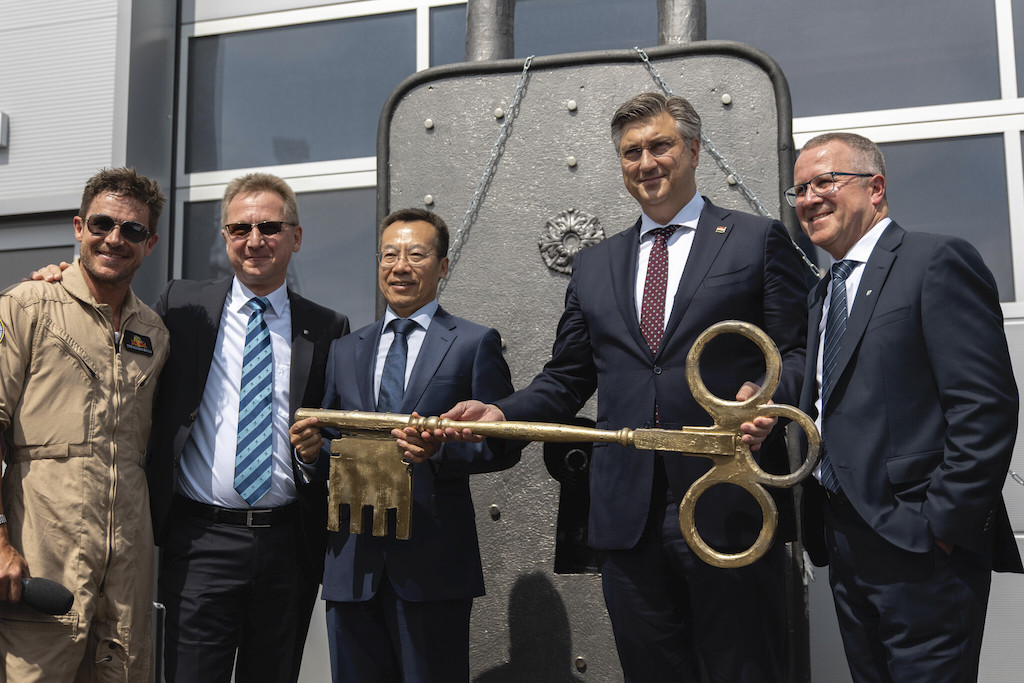
Further expansion stage in planning
The excellent infrastructure, the proximity to Zagreb, highly trained experts, universities in the surrounding area with highly qualified specialists in many fields as well as the outstanding logistical connections to FACC's corporate headquarters and its European customers were among the main reasons for the decision in favor of manufacturing cabin components for business jets and commercial aircraft in Jakovlje. "After the successful start with more than 170 employees, we plan to expand the workforce of the plant to around 600 employees within the next four years," CEO Robert Machtlinger announced at the opening event.
State-of-the-art greenfield plant
The new FACC plant was planned in close cooperation with the Fraunhofer Institute. The goal was to construct a plant according to cutting-edge aspects of industrial manufacturing. Scaling was also an important factor during planning. A modular expansion of additional plant extensions, which in turn integrates into the existing structure, was a fundamental prerequisite for the design of both the interior and the exterior.
During the official opening of the plant, the next expansion phase of the site was announced. Expansion stages 2 and 3, which will see a threefold increase in the size of the plant, will be started with immediate effect.
Fact box on the new plant in Croatia:
- Total investment volume (construction phase 1 plus land): approximately EUR 15 million
- Construction of a state-of-the-art and efficient production facility for the manufacture of cabin components for business jets and passenger aircraft
- Largest greenfield investment outside Austria in the history of FACC
- Planned workforce expansion from 170 to 600 employees
About FACC
FACC is a worldwide leading aerospace company in design, development, and production of aerospace technologies and advanced aircraft lightweight systems. Being the technology partner of all major manufacturers, FACC works together with its customers on developing solutions for the mobility of the future. Every second, there is an aircraft taking off with FACC technology on board. In the fiscal year 2021, FACC achieved 497.6 million Euro in revenues. Approximately 3,000 people from 41 nations are employed at 13 international locations worldwide. FACC is listed on the Vienna Stock Exchange and part of the Fortune-500 Group AVIC, providing access to the largest growth markets within the industry. For more information please visit facc.com.
For more, check out our dedicated business section.
Krk Island: Its Embark on Sustainability
June 18, 2022 - Croatia, home to many eco-enthusiasts, has made it its core aim to advocate the importance of going green and building initiatives that advise citizens to live an eco-friendly life. Now more than ever is the condition of the Earth important – as man-made climate change continues to be a focal threat to our planet. Therefore, Krk Island can be seen as a vast promoter of the reduction of greenhouse gas emissions in the Mediterranean region.
Located in the northern Adriatic Sea, at the centre of the Kvarner bay, the “Golden Island” does have a great deal to offer. By being considered one of the most attractive tourist destinations the Island’s mild Mediterranean climate and diverse nature become highly appealing to the public during the summertime. Moreover, its cultural heritage has given it the name of the “Cradle of Croatian culture” as it is abundant in all aspects of allurement.
With the introduction of the “Krk – Energy-independent and CO2-neutral Island” project, Croatia’s energy transition towards renewables continuously expands, as well as demonstrates that carbon neutrality can be profitable to other islands and the Croatian mainland. The wide installation of solar power is established to grant Krk the possibility of becoming energy self-sustainable and carbon-neutral by 2030. Thus, encouraging a positive experience for visitors and minimising the impact of tourism on the environment.
A goal for a climate-neutral Europe has been set by the future European Green Plan and the Mediterranean Strategy for Sustainable Development. According to the 10th Energy Conference of the Island of Krk, such an outcome is set to be achieved through “strengthening the economy with green technologies, creating a sustainable economy and reducing pollution”.
The project has been implemented by Eko Kvarner in cooperation with the European Asbestos Risk Association from Trieste, Italy, and Krk town. Additionally, seven of the local government units on the Island are included in the project with the objective of divulging a green economy as Croatia’s ultimate future.
Overall, it is known that buildings on the Island have been renovated in order to improve their energy efficiency and local inhabitants are permanently educated about energy-saving measures. So, do not miss the opportunity to visit Krk Island for its splendour and its progress towards sustainable development!
For more, check out our dedicated lifestyle section.
Sinković Brothers Book Rowing World Cup Final in Poznan!
June 18, 2022 - The Sinković brothers continue to impress this season, booking a spot in the Rowing World Cup final on Sunday in Poznan!
Brothers Martin and Valent Sinković convincingly won a place in the double sculls final at the second World Cup in Poznan!
In their semi-final race, which we can call the final before the final, the Sinković brothers won with a time of 6:13.29, ahead of the Polish crew (6:15.46) and the Dutch crew (6:16.24). In the second group, the crews of Australia, Germany, and the Netherlands also won a spot in the final.
"We are very pleased with the race. We felt good, we controlled from the very beginning and showed what our best rowing is. There is still room for progress in the final, but it was a strong group and we believe that the Dutch and the Polish crews will be the strongest in the competition tomorrow," said Valent Sinković.
“We expected one tough race from the start, and in the end, it was controlled from the start. We are very satisfied, we enjoyed rowing, tomorrow we are going to row even better and we hope to win!" said Martin Sinković.
The final race is scheduled for tomorrow, June 19 at 11:38, and you can follow the race on the official website www.worldrowing.com
Just a few weeks ago, the Sinković brothers won a gold medal in Belgrade. With a time of 6:09.26, they won the gold medal in the double sculls at the 1st World Cup rowing competition in the Serbian city. With a great finish in the final 250 meters, they defeated the leading Poles and entered the finish line with just over a one-second advantage. Third place went to the Spaniards who were 3 seconds and 26 hundredths of a second behind.
For more, make sure to check out our dedicated sports section.
Neretva River Mouth Again an Attraction for Ornithologists and Bird Watchers
June 18, 2022 - The Neretva River mouth remains one of the best destinations for bird watching in Croatia, though it's hardly being promoted as such.
To the great surprise of ornithologists and nature lovers in the Parila lagoon, a great white pelican nestling (Pelecanus onocrotalus) appeared three years ago. It is a bird species that was presumed to have become extinct in the entire Republic of Croatia in the 1950s due to uncontrolled hunting and fishing and the reclamation of wetlands, which damaged ornithological habitats. However, pelicans have appeared at the mouth of the Neretva for the last five years, once again becoming a bird's paradise. Thus, several species of wetland birds were observed, with various ducks, grebes, herons, and spoonbills, reports Slobodna Dalmacija.
Mediterranean wetlands are globally known for the exceptional diversity and richness of the bird world. Unfortunately, due to over-intensive hunting and carelessness, the Neretva Valley has fallen from the list of the most famous and richest Mediterranean wetlands, such as the Camargue in France, Donana in Spain, and several lagoons in Italy, Turkey, and Tunisia.
"Despite all the problems - reed fires, invasive species such as mongooses, poaching, river flow regulation (hydropower and sewerage), reduction of freshwater inflows (interventions in BiH), illegal land reclamation, etc., the Neretva Delta remains one of the best destinations for bird watching in Croatia. In the Neretva valley, you can see the partridge, Western black-eared wheatear, or the barn owl.
Due to its large reed beds, the Neretva is a vital nesting ground for Eurasian bitterns and Porzana species. In addition, the sandy lagoons at the mouth of the Neretva are alive all year round. More than 300 recorded bird species for such a small area is an impressive number and has the potential to attract tourists throughout the year," says Iva Rajković Alendar from the association "Biom."
However, in the field, the changes are noticeable for the better regarding the bird world. Changes happen slowly, but importantly, they do happen. One of the positive changes is new reserves.
"The Special ornithological reserve "Blue Eye and Lake Desna," Special ornithological-ichthyological reserve "Neretva estuary," and Special ornithological reserve "Kuti. It is now important that real protection is established in the existing reserves and that the reserves remain on paper. What does not improve the situation is, for example, fires. This year, almost the entire "Pod Gredom" and "Prud" reserves near Metković burned down again. This is a great disaster for birds that depend on the layers of old reeds and because of which the reserves were established," says Iva.
And while ornithologists are struggling with fires, fortunately, the number of poachers has been reduced. However, the prevailing opinion in the Neretva is that swamps are set on fire by hunters to secure hunting plans. Local hunting associations have repeatedly denied this.
"What can certainly be noticed is the reduced number of poachers. For example, when we started highlighting the problem in 2017, in the Neretva delta for decades in, say, December on Parila, in the Neretva Channel, and the Galičak Bay located in Ušće, you could see 11 to 15 people hunting continuously from 8 pm to sometimes 11 in the morning.
Today it is two to three people. But the number of shots remains worrying. On average, there are 150 shots fired in one night on Lake Parila in the "Neretva Estuary" reserve, and poaching takes place almost every night when there is no rain. There are changes in the reserves "Prud" and "Pod Gredom" near Metković. The number of illegal plans is much smaller, but there are still shootings in the reserves, but invitations are heard less often, which is positive.
But while there is a high demand for the meat of one wild bird, the viability of any shift in the fight against poaching is questionable. On the Neretva, we conducted a socio-economic analysis through which we found that 56 percent of respondents consume coot. Furthermore, 29 percent of respondents consume it regularly. Coot is eaten when hanging out with friends and family or during important holidays. When you visit, there must be a coot on the table in some places. Demand for game meat creates a relatively large market that is satisfied by birds from illegal hunting."
Despite everything, new bird species are coming to the Neretva.
"The Neretva Delta is special in terms of the bird world. Species rare in other parts of Croatia are common migratory or wintering species. There are numerous ducks, sandpipers, jays, sterninae, pied avocet, and oystercatchers. The Neretva is also on the edge of the range of some completely southern species, such as the olive-tree warbler. The local association "Brkata sjenica" from the Neretva recorded a Eurasian stone-curlew, which is important because the Croatian population is endangered.
All in all, our goal is not to attract new species, but it is important to preserve the habitats for those that are already coming. And then protect them while they are there," believes Iva Rajković Alendar. Furthermore, given the rich bird world, the Neretva delta has great potential for the development of birdwatching, which is reserved for guests of deeper pockets.
It should not be forgotten that the Neretva Valley is very close to Dubrovnik, whose most numerous visitors are British tourists - the most dedicated bird watchers worldwide. Most of them pass through the Neretva Valley during a trip to Mostar. On the Neretva, birds can be observed throughout the year, and bird watching is one of the branches of tourism that can take place throughout the year. However, the creation of a tourist product and its promotion on the market is yet to take place in the Neretva Valley. Instead of realizing this, it has been debated for years whether the Neretva, with its bird wealth, is an area suitable for bird watching.
What should be done to make birdwatching come to life in the Neretva Valley?
"It must be accepted and promoted by the inhabitants of the Neretva Valley, and it is vital to take care of, i.e., raise awareness about the preservation of this valuable resource in the local community. In addition, the area should be promoted at events like BirdFair in England and other fairs. BirdFair is one huge fair dedicated to bird watching.
Various events can be organized at the state level to actively promote the Neretva Valley as a paradise for bird watchers. For example, the Association "Brkata sjenica" is actively working on the development of bird watching in Croatia. Since 2016, they have organized more than ten bird recognition trainings and broadened the community of fellow citizens who also come as tourists to the Neretva delta to observe birds.
There are many similar examples in the world. The best, of course, are the numerous English reserves managed by NGOs such as the Wetland & Wildfowl Trust or the Royal Society for the Protection of Birds (RSPB). In our immediate neighborhood, we can cite the example of Škocjan Bay in Slovenia, where a compromise was found between preserving coastal wetlands and seaports. As a result, Škocjan Bay, with its good infrastructure, has become a prevalent location for bird watching. This is the case in Slovenia, and further south in Montenegro, Albania, and even in our country; it is still necessary to explain why it is crucial to preserve biodiversity and how it is a vital resource."
For more, check out our dedicated lifestyle section.
Zadar Digital Nomad Week Diary: Third Day
June 18, 2022 - On the third day of the Zadar Digital Nomad Week, the participants were able to enjoy a program that brought them closer to the rich history and spectacular landscapes in the Zadar region, beyond the city.
After a successful couple of days introducing Zadar Digital Nomad Week, where the participants were able to familiarize themselves with the Dalmatian city and get to know each other better, the program continued with activities that would take them briefly out of the city to enjoy some gems that few know in the region. The slogan of the third day of the Zadar Digital Nomad Week was ''Recharge in Nature'', and it is unique that few regions in Croatia can boast of having so many varied National Parks located less than an hour from the city: Kornati and Telašćica in the sea, and Paklenica, North Velebit, and Velebit in the mountain range. Ideal to disconnect from work and reconnect with the natural surroundings.
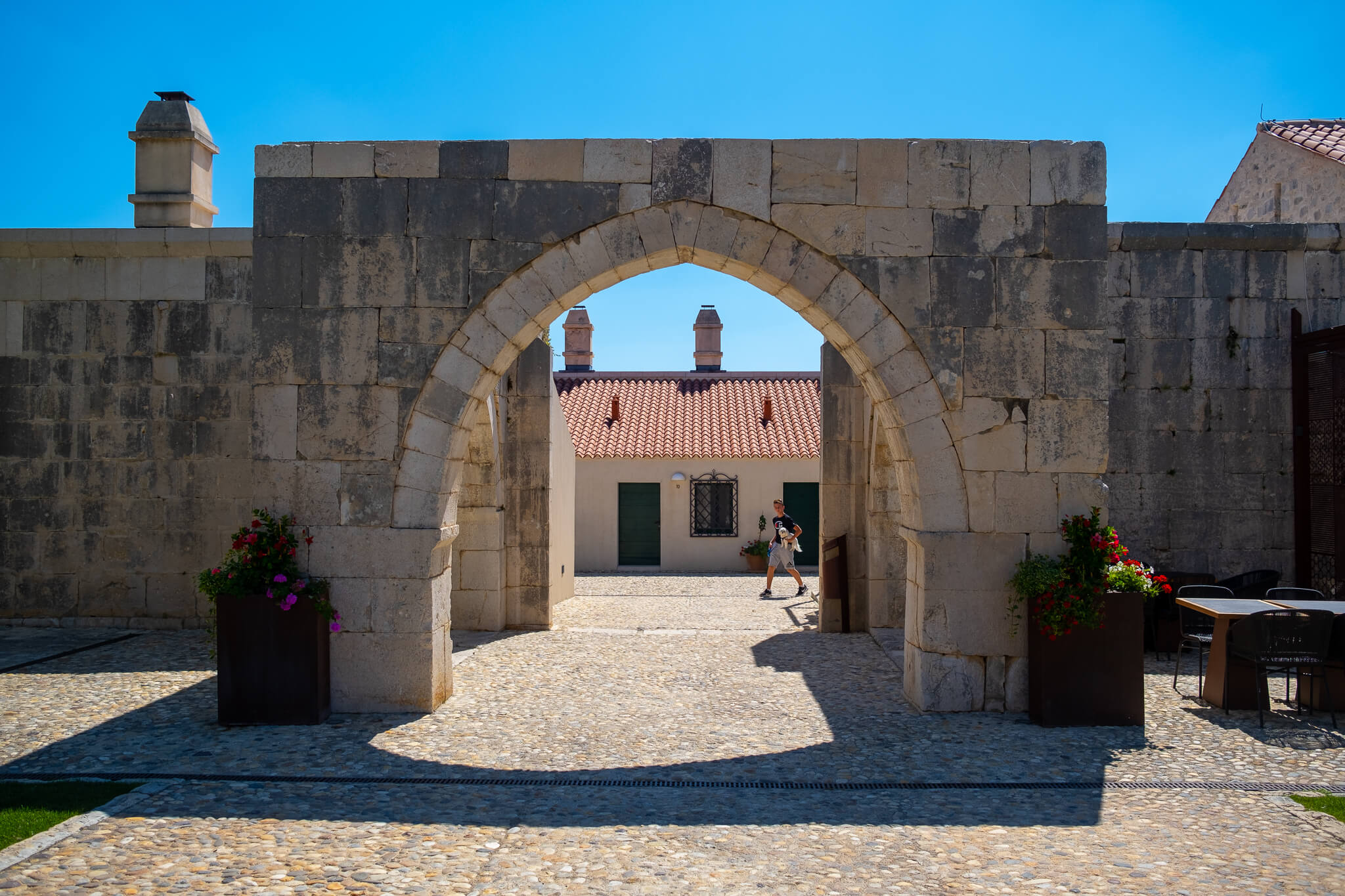
But before exploring the natural landscapes of the Zadar region, it was necessary to start the third day of the Zadar Digital Nomad Week with something to eat and, as a great bonus, some important history of the area. Fifty minutes from the city by car, and located in the Pakoštane area, is the historic Ottoman residence of Maškovića Han. The construction of Mašković Han began in 1644 by the order and funds of Jusuf Mašković, originally from Vrana, a high dignitary on the Sultan's court and a supreme admiral of the Turkish fleet. Han was intended to be a summer house/residence for Mašković when he returned from Constantinople to his homeland. It was conceived as a luxuriant monumental and modern building that would have all the necessary comforts, including a Turkish bath-Hamam.
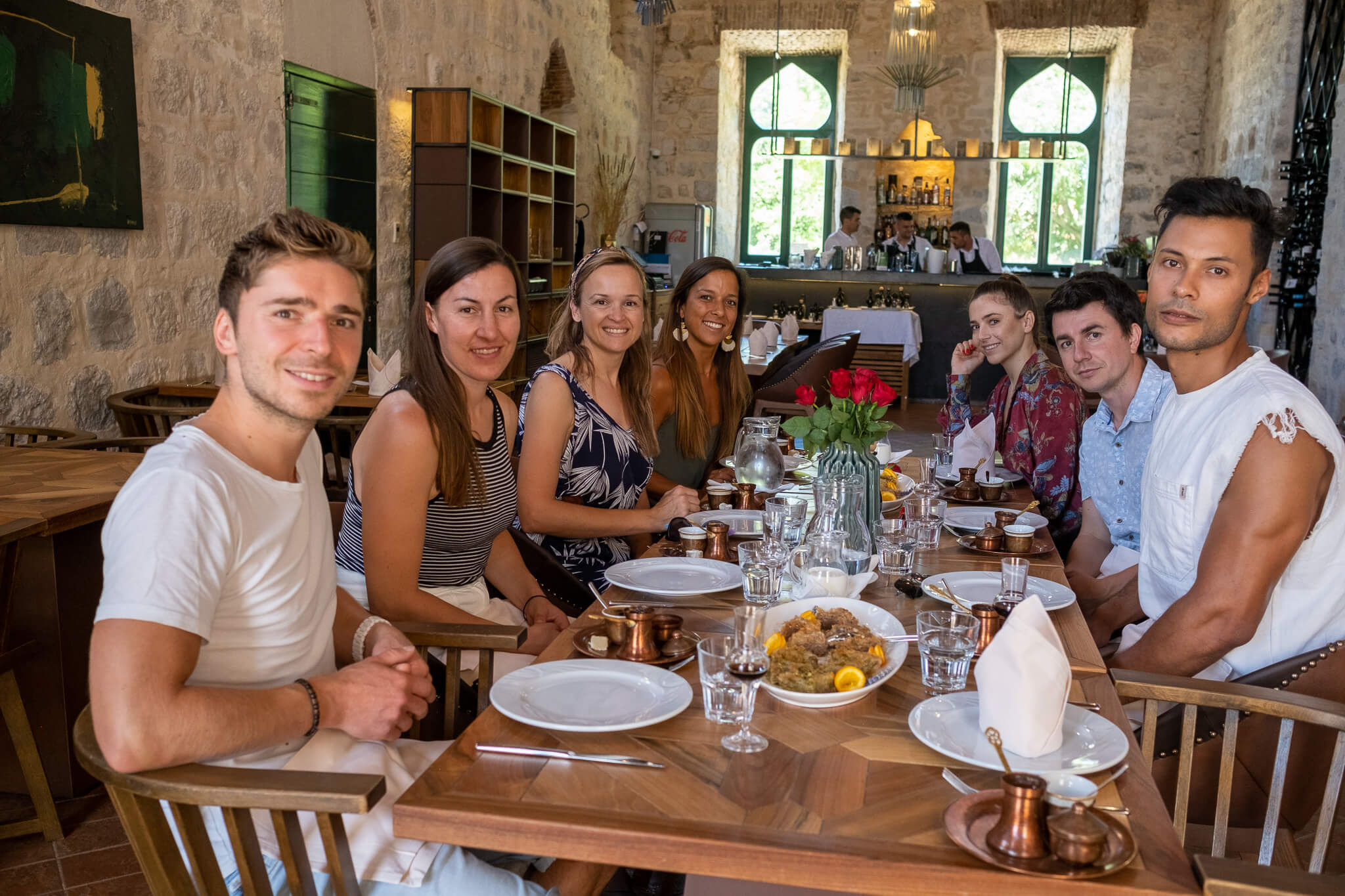
Significant funds were invested in the construction, and there were even 500 workers working on it every day. In 1645, Mašković, with 60,000 warriors, conquered Crete, and the nobility that he showed towards the captured Venetian soldiers and citizens made him one of the most prominent warriors of all time, but he provoked the anger of the sultan who summoned him to the court where Mašković was then executed. His tragic destiny left a trace also on Han, which was not completed in the planned form, but rather in a much more modest form.
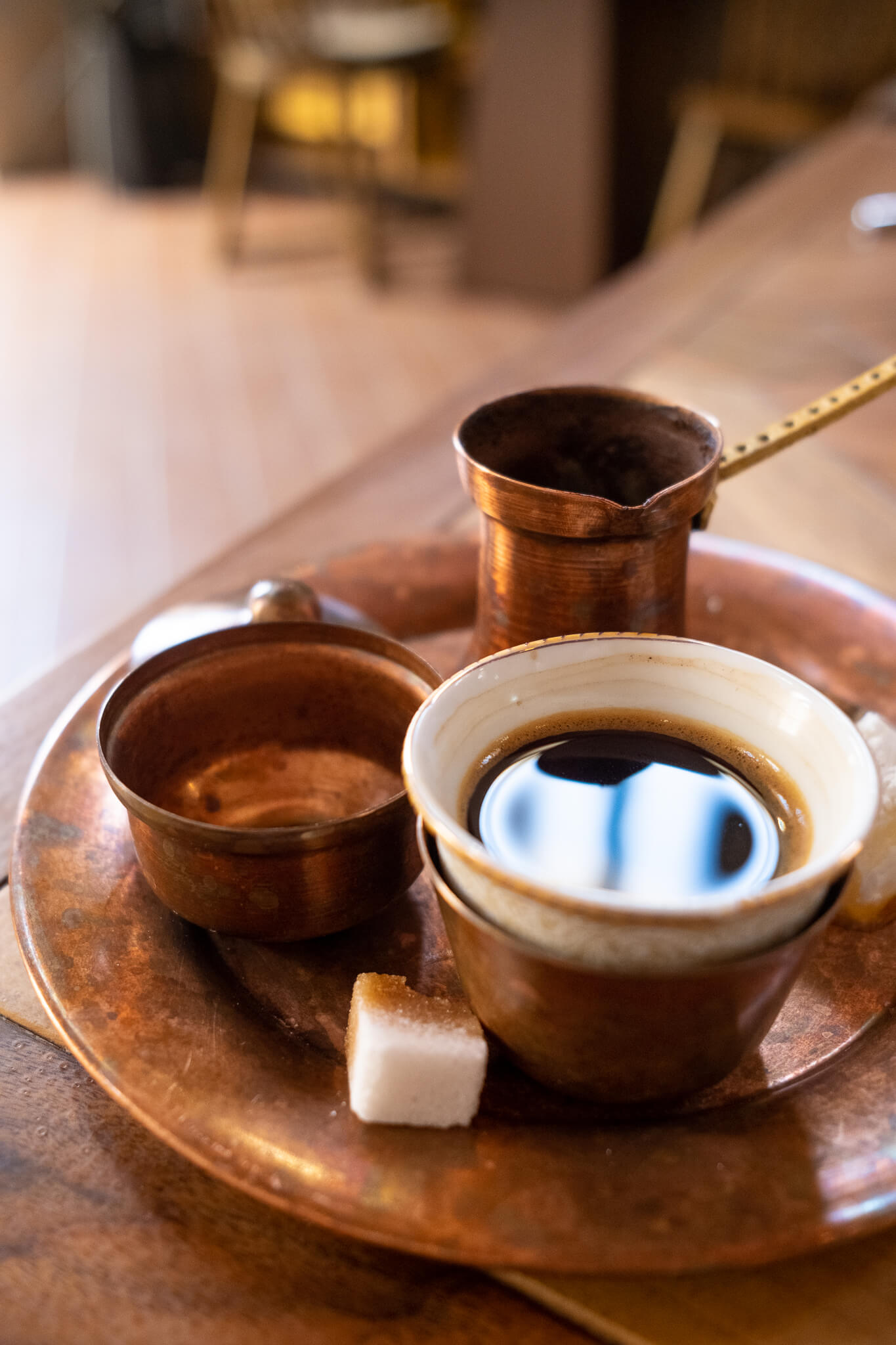
Within the Ottoman walls of Maškovića Han, ZDNW participants enjoyed a spectacular Turkish coffee and baklava to calm their appetite, followed by a hearty lunch to fuel up for the day's next activities.
Following an excellent brunch and lunch at Maškovića Han, we headed to the shores of Lake Vrana, the largest lake in all of Croatia. One would think that, due to its impressive size, it would be found on a beach on the Adriatic coast, but in reality, it is a magical freshwater destination that is worth exploring in the summer as an alternative to beaches and coves. Under the shade of the trees provided by Camp Vransko Lake Crkvine, we were able not only to rest and properly digest lunch, but also to catch up on work. Isn't that the essence of being a remote worker in the middle of nature?
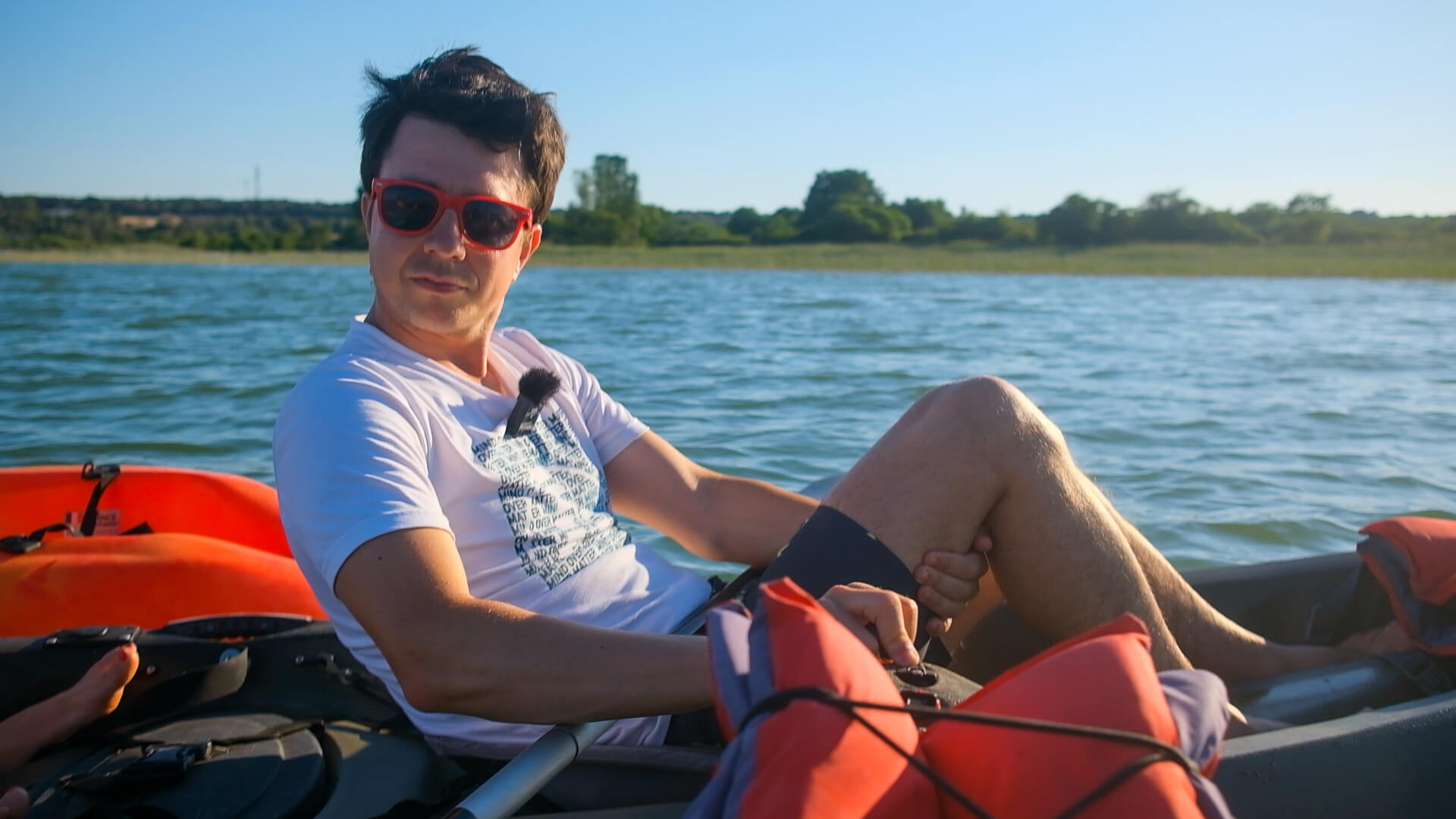
After recharging our batteries, a very unique activity followed. We got on kayaks and paddled to enter the waters of Lake Vrana, where Michael Freer offered a keynote on the social impact of being a digital nomad in each destination they go to. Floating in the refreshing waters of the largest lake in Croatia, we were able to learn more about the different ways one can get involved socially in Croatia, such as volunteering and social development projects. Who better to offer the keynote than Michael, who in his many years in Croatia has managed to lead various social projects.
After the keynote, we met again in Maškovića Han, where a van was waiting for us to go to the next and last destination of the day. At Maškovića Han, we had a special reunion with some dear familiar faces from last year in Dubrovnik: Marlee and Jeff McCormick, who participated in the memorable Digital Nomads in Residence program at the Pearl of the Adriatic. They flew from their home, in Texas, to spend a few days enjoying the excellent June weather in the Adriatic and to be part of the Zadar Digital Nomad Week.
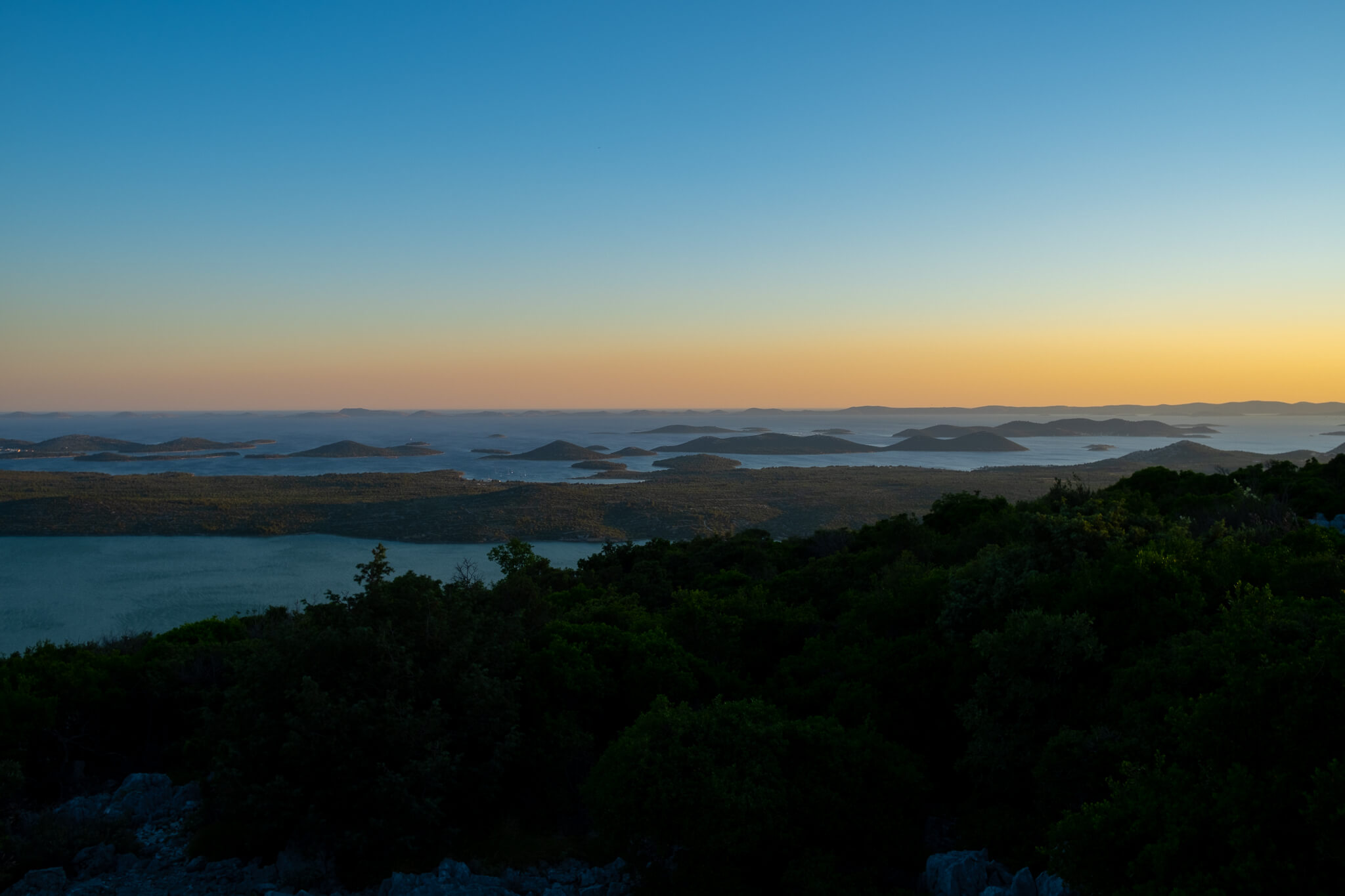
We drove in the early evening hours to Vidikovac Kamenjak, just 20 minutes from Maškovića Han: a viewpoint located on the top of the peaks behind the Vrana lake with perhaps the best view I have ever had in my life. I must admit how hard it is for me to explain in detail what one can feel with the landscapes from that viewpoint and, above all, with the sunset falling.
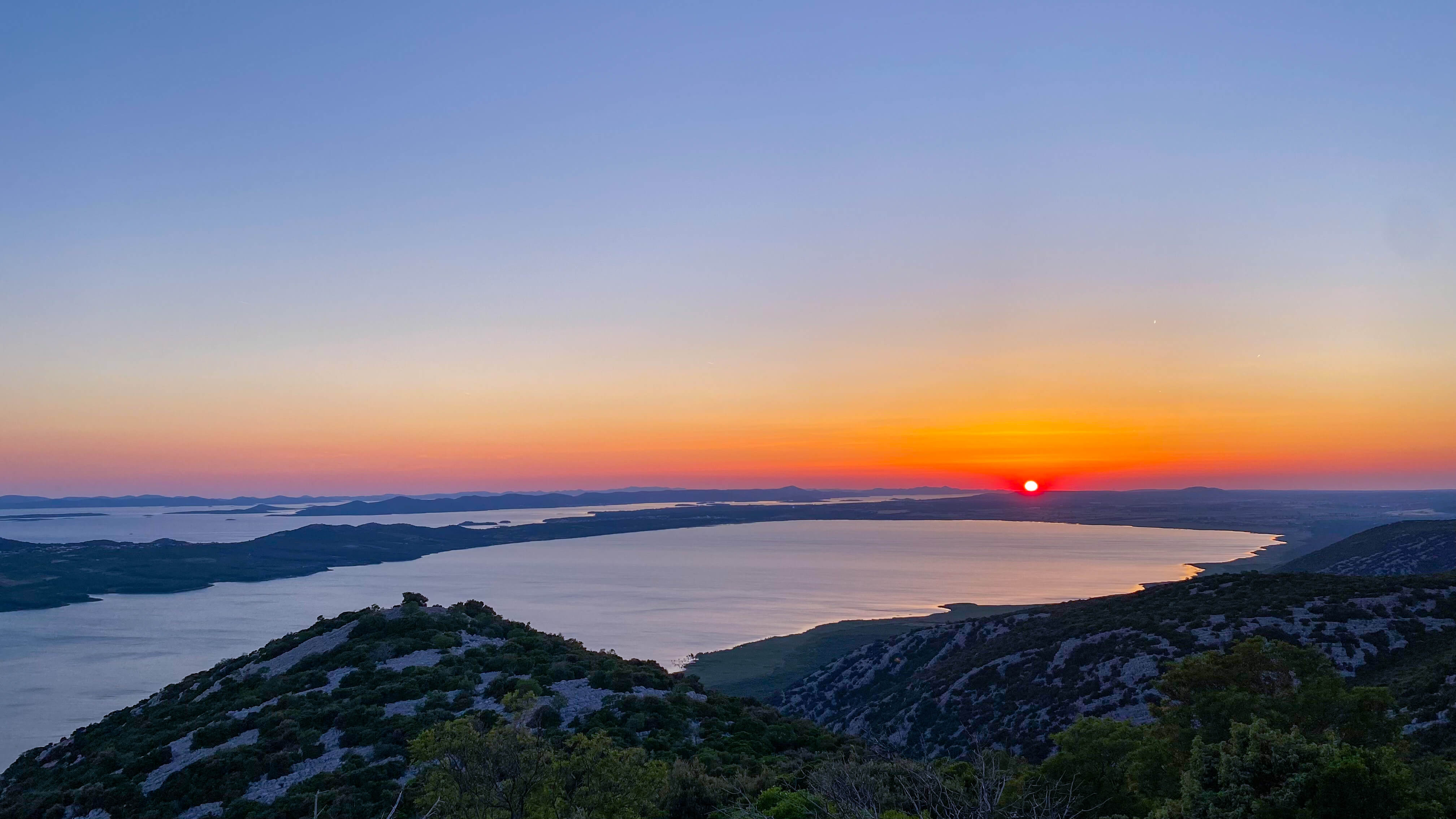
With just a turn of the head, one is able to appreciate the island of Murter north of Šibenik, the archipelagos of Kornati and Telašćica, or the islands of Žut and Pašman, belonging to Zadar. And, of course, the lake of Vrana in all its immensity, in whose waters rested the last rays of daylight and, shortly after, a full moon that completely illuminated the lake. And the photos and sightseeing were not the only things, since Tanja Polegubić from Saltwater saw in this last activity of the day a great opportunity to share a picnic with fantastic proseccos, and delicious appetizers.
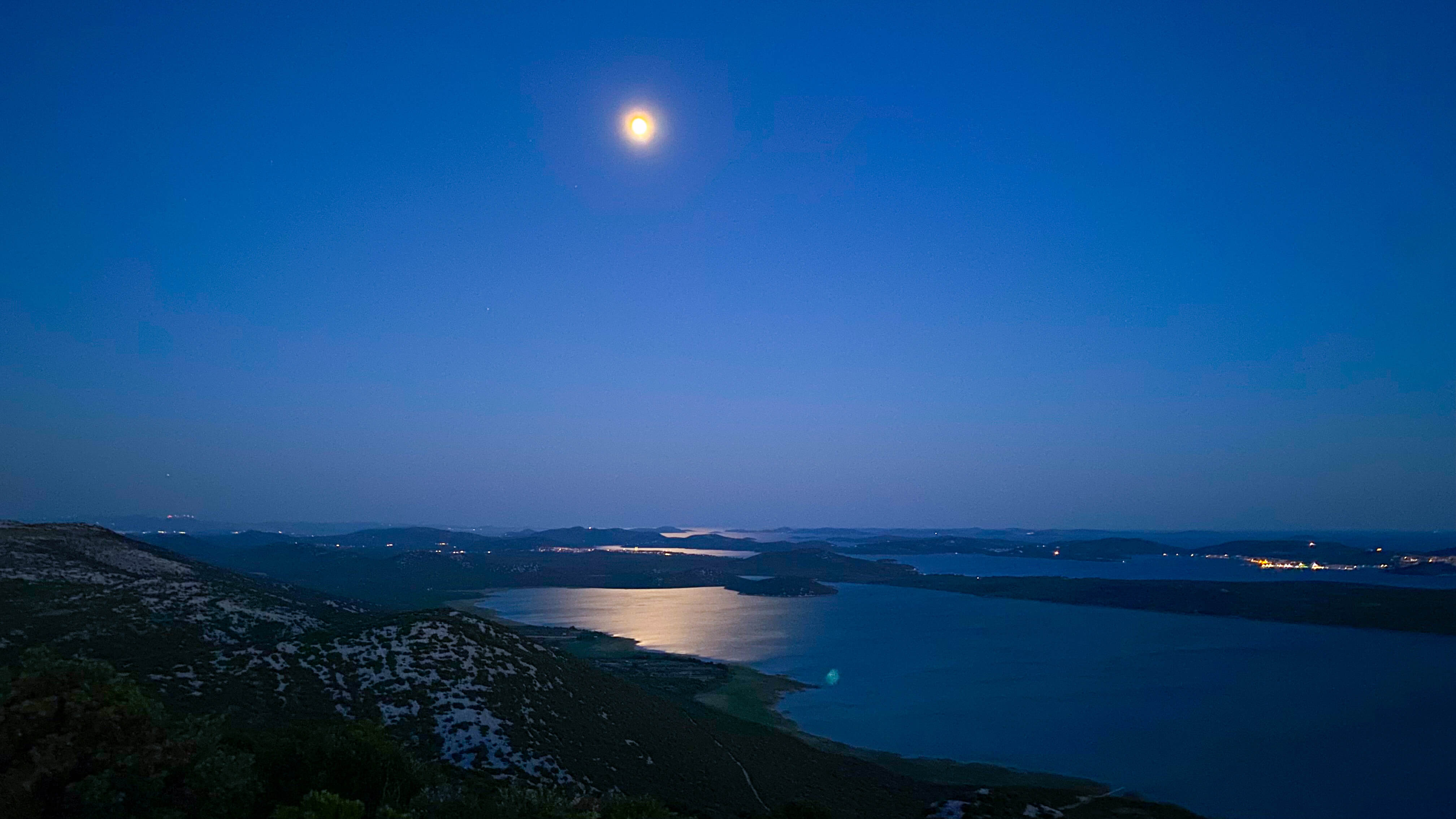
And that's how when night fell, we returned home to close a magical day in the nature of the Zadar region and ready to start the week with great energy and eager to see what the program had in store for us.
For the latest news and features about digital nomads in Croatia, check out the dedicated TCN section.
Croatian Cruise Traffic Makes Decided Return in Post-Pandemic Era
June the 18th, 2022 - Despite being the subject of endless complaints before the global coronavirus pandemic struck and forced the industry to a halt, Croatian cruise traffic is making a marked comeback as we approach the height of the summer tourist season.
Croatian cruise tourism was an enormous ecological issue up and down the coast, but the vast majority of (understandable) complaints and issues arose from Croatia's tourist Mecca - the southernmost city of Dubrovnik. The Pearl of the Adriatic felt plagued by these giant floating cities which pollute the waters and cause enormous infrastructure issues for the entire area. The pandemic, which threw a massive spanner in the works for more or less all forms of travel, especially for leisure and tourism, saw Dubrovnik's waters free of huge vessels for a very long time.
It seems now, however, that Croatian cruise traffic is making a decided return to not only the country's traditionally most visited city, but all along the coast. Sibenik, quite a bit further up the coastline, included.
As Mladen Miletic/Poslovni Dnevnik writes, Viking Sky, a 228-metre-long Viking Cruises cruiser flying the Norwegian flag, made its way through the St. Anthony's Canal in front of the Port of Sibenik a couple of days ago.
This ancient coastal Dalmatian city, which is steeped not only in history but also in rich culture, has now become almost a regular stop on the routes of this gigantic 400 million US dollar ship with accommodation capacities for more than 1,000 passengers who can enjoy two swimming pools, a winter garden, theatres and cinemas, and numerous shopping opporunities when on board.
In gorgeous Opatija last weekend, the luxurious Azamara Onward could be seen floating in front of the array of Austro-Hungarian architecture this Kvarner town is so famous for. The Marella Explorer 2 was also moored in the nearby Port of Rijeka, whose company announced the arrival of nineteen large ships for this summer tourist season, while the aforementioned City of Dubrovnik expects as many as 345 cruise ship arrivals this season, bringing with them more than half a million passengers.
For more on Croatian cruise traffic and tourism, make sure to check out our dedicated travel section.


